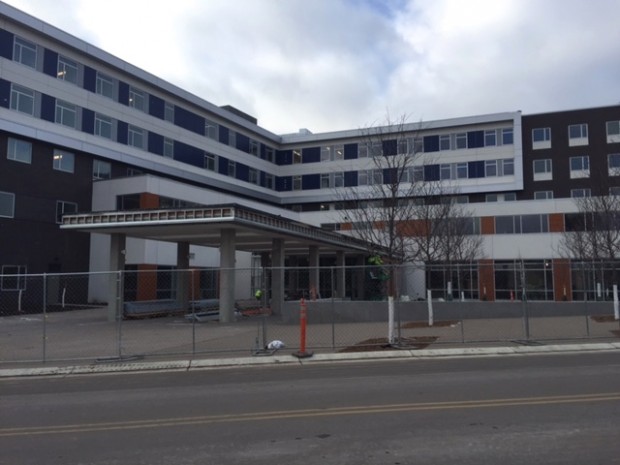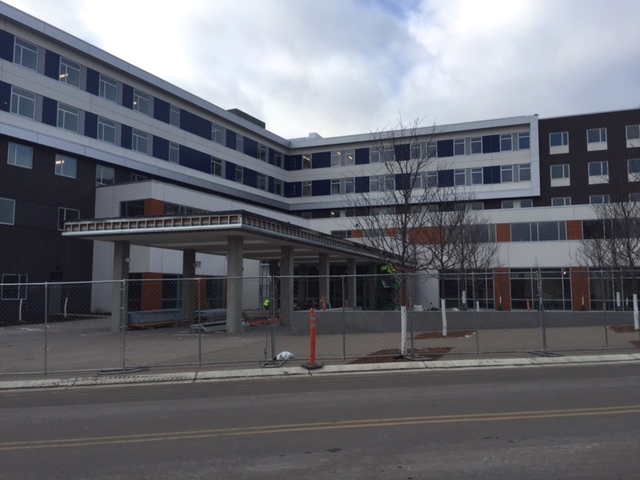
The Dorothy Day Center was originally built to be just a drop-in center, and it became overcrowded. The Dorothy Day Place will be two buildings and will push to help transition those staying there into permanent housing. (Kassie Vivant/TommieMedia)
Currently, about 250 people find shelter at the Dorothy Day Center each night, sleeping on thin mats on the floor just inches apart from one another. However, Catholic Charities’ Higher Ground St. Paul, a new chapter in their fight against homelessness in the Twin Cities, may change all of that—just in time for the holidays.
After more than three years of planning, Catholic Charities will open the doors in December to part of its new center, Dorothy Day Place. Therese Gales, media relations manager for Catholic Charities, said Higher Ground St. Paul will open late December while the other building, the St. Paul Opportunity Center and Dorothy Day residence, is set to start construction in 2017.
In 2015, the Wilder Foundation found that about 9,300 people who are homeless live in Minnesota. Gales said the Dorothy Day Center in St. Paul currently supports about 6,000 people each year. Since it was originally built in 1981 to only function as a drop-in center, Gales said the center has become overcrowded, so the new facilities are necessary.
“Over time, the numbers of people experiencing homelessness increased, and it became essentially a 24/7 shelter every day of the year, and it was never really designed to do that,” Gales said. “The need had sort of outgrown the space that we had, and it just really had reached kind of a crisis point.”
The strive to help people who are homeless find permanent housing is an important movement for the new Dorothy Day Place. The new complex will offer about 364 permanent housing units.
“We’ll be able to have a dignified shelter and permanent housing and services to help people work their way up and out of homelessness. So there’ll be a real push to help people gain access to housing,” Gales said.
Gales said the new Dorothy Day Place will house about 280 people each night in temporary housing that is much more dignified and private than the current conditions. People can sleep on bunks for free or partake in a pay-for-stay system in which people can pay $7 for a night or $42 for a week with the advantage of a reserved bunk and services like access to a computer lab.
The system also helps patrons and save money for the future, because that pay-for-stay rent goes into an account for their future housing.
“The idea is to provide an incentive for people to make an investment, because basically the money gets put into an account for them. And they can access it later if they want to get permanent housing,” Gales said. “So if they get an apartment, they can use that money that they’ve put in to pay the first month’s rent or a damage deposit.”
Sociology professor emerita Meg Karraker required students in her introduction to sociology class to volunteer at Dorothy Day because she believes sociology is connected with social action. She also believes that communities should care for and respect everyone.
“People who are in the hardest places of their lives deserve compassion and they deserve care and they deserve support,” Karraker said. “Dorothy Day has risen to the cause and has met that need for so many years.”
Karraker believes the new building will not only provide a more respectful space for those who stay there, but it will also allow the community to better provide for those in need of the services.
“It will also, I think, make it easier for professionals, including mental health professionals, employment and education counselors, family social workers, to get in there and deliver services in confidential and appropriate ways,” Karraker said. “It’s not just about a building, it’s about the people who feel called to do this kind of service.”
The Dorothy Day Center is named after journalist and social activist Dorothy Day. History professor Anne Klejment, who studied Dorothy Day’s impact in history, said Dorothy Day founded houses of hospitality to help those in need. Klejment believes the services of the Dorothy Day facilities reflect Dorothy Day’s historic passion to help those in need in the community.
“She was seeing people who were involved in reform, but it wasn’t really answering the question of poverty. The question she had was, ‘Why do we have any to begin with?’” Klejment said. “Then she founded what were called houses of hospitality. And that was taking in … people who nobody else wanted.”
For Gales, the goal is to take action to help those in need back on their feet.
“I don’t know that we’ll ever completely end homelessness, but the idea is to make it brief and rare and nonrecurring,” Gales said.
Kassie Vivant can be reached at viva0001@stthomas.edu



